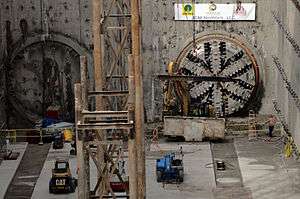Northgate Link extension
| Northgate Link extension route map | ||||||||||||||||||||||||||||||||||||||||||||||
|---|---|---|---|---|---|---|---|---|---|---|---|---|---|---|---|---|---|---|---|---|---|---|---|---|---|---|---|---|---|---|---|---|---|---|---|---|---|---|---|---|---|---|---|---|---|---|
Legend
| ||||||||||||||||||||||||||||||||||||||||||||||
Northgate Link extension (formerly known as "North Link"[1]) is a Link Light Rail extension in Seattle, Washington that will connect the University District to Northgate. Northgate Link will travel in two tunnels from University of Washington station, the northern terminus of the University Link Extension, through underground stations at U District and Roosevelt towards Northgate, emerging on the east side of Interstate 5 and continuing on an elevated guideway to Northgate station. The extension was approved in 2008 by voters in the Sound Transit 2 (ST2) package, began construction in 2012, and is expected to open for service in 2021.
Routing
For the Northgate Link extension project, the paired tunnels constructed for University Link will continue north to the University District and the Roosevelt neighborhoods before emerging at the surface along I-5 near NE 94th Street to serve the elevated Northgate station.
Sound Transit is preparing to extend mass transit from Northgate to Lynnwood, which voters approved as part of the Sound Transit 2 Plan in 2008, along with funding to continue planning future service all the way to Everett. This project is known as the Lynnwood Link extension project.
Stations
| Name | City/Neighborhood | Location |
|---|---|---|
| University Link Tunnel to Capitol Hill and Westlake | ||
| University of Washington | University District, Seattle | Montlake Blvd. NE and NE Pacific St. |
| North end of University Link | ||
| U District | University District, Seattle | NE 45th St. and Brooklyn Ave. NE |
| Roosevelt | Roosevelt, Seattle | NE 65th St. and 12th Ave. NE |
| North end of tunnel (Maple Leaf Portal); south end of elevated section | ||
| Northgate | Northgate, Seattle | 1st Ave. NE and NE 103rd St. |
| End of line; future extension to Lynnwood | ||
Construction

Construction on the Northgate Link extension began in 2012 and is scheduled to open for service in 2021.[2]
Tunnels
Each 3.4-mile (5.5 km) tunnel is dug southbound, starting from the Maple Leaf Portal, in three segments separated by stations, using a 21.5-foot (6.6 m) diameter tunnel boring machine. The machine digging the tunnel for northbound trains was named "Brenda" and the sister machine for the southbound trains was named "Pamela", but the names were dropped in March 2016 to reduce associations with the troubled "Bertha" machine used on the Alaskan Way Viaduct replacement tunnel project.[3] Brenda was previously used on the University Link Tunnel from 2011 to 2012, digging both tunnels between Capitol Hill station and the Downtown Seattle Transit Tunnel.[4]
TBM #1 (formerly Brenda) began excavation of the northbound tunnel on July 9, 2014,[5] and reached Roosevelt station on March 17, 2015.[6] It later reached the U District station on November 6, 2015,[7] and completed the entire northbound tunnel to University of Washington station on March 30, 2016, less than two weeks after light rail service to that station from Downtown Seattle had begun.[8] TBM #1 was disassembled and removed from the University of Washington station. Due to damage sustained by TBM #2, TBM #1 was refurbished and excavated the last (southbound) tunnel segment between June and September 2016.[9][10]
TBM #2 (formerly Pamela) began excavation of the southbound tunnel on November 20, 2014,[11] and reached Roosevelt station on July 13, 2015.[12] For six weeks from late December 2015 to early February 2016, the machine was stopped at a point 650 feet (200 m) north of U District station after encountering hard soil that damaged five motors and the main gear of the machine. Repairs were made and the segment was completed on March 24, 2016.[13] Additional repairs to TBM #2 needed to complete the final (southbound) tunnel segment would have potentially delayed the project's opening if the five months of float time were exceeded,[14] leading JCM Northlink to finish the final segment with TBM #1.[9]
References
- ↑ "New Project Name". Sound Transit. Retrieved July 20, 2012.
- ↑ "Project phases – Northgate Link Extension". Sound Transit. Retrieved May 5, 2016.
- ↑ Bush, Evan (March 28, 2016). "Thanks to Bertha, Sound Transit nixes nicknames for its own tunnel machines". The Seattle Times. Retrieved April 4, 2016.
- ↑ Stiles, Marc (April 28, 2014). "Bertha's stalled, but Brenda's ready to roll once again". Puget Sound Business Journal. Retrieved May 5, 2016.
- ↑ Miller, Ben (July 10, 2014). "Boring! Sound Transit's Northgate tunnel machine begins digging". Puget Sound Business Journal. Retrieved May 5, 2016.
- ↑ Lindblom, Mike (March 17, 2015). "Transit-tunnel machine reaches daylight at Roosevelt Station". The Seattle Times. Retrieved May 5, 2016.
- ↑ "Sound Transit tunnel boring machine reaches U District station site" (Press release). Sound Transit. November 6, 2015. Retrieved May 5, 2016.
- ↑ "TBM 1 has tunneled to the UW Station". Seattle Daily Journal of Commerce. March 31, 2016. Retrieved May 5, 2016.
- 1 2 "Northgate Link Tunnel Boring Is In The Final Stretch". The Urbanist. Retrieved July 1, 2016.
- ↑ "Sound Transit contractor completes mining last tunnel segment for Northgate Link Extension" (Press release). Sound Transit. September 2, 2016. Retrieved September 2, 2016.
- ↑ "Sound Transit launches second Northgate Link tunnel boring machine" (Press release). Sound Transit. November 20, 2014. Retrieved May 5, 2016.
- ↑ "Sound Transit finishes second light rail tunnel from Northgate to Roosevelt" (Press release). Sound Transit. July 13, 2015. Retrieved May 5, 2016.
- ↑ Banner, Ellen (March 24, 2016). "Tunnel machine breaks through in the U District". The Seattle Times. Retrieved March 28, 2016.
- ↑ Lindblom, Mike (February 11, 2016). "Another Seattle tunnel drill (not Bertha) damaged, needs repair". The Seattle Times. Retrieved February 11, 2016.
External links
| Wikimedia Commons has media related to Northgate Link Extension. |